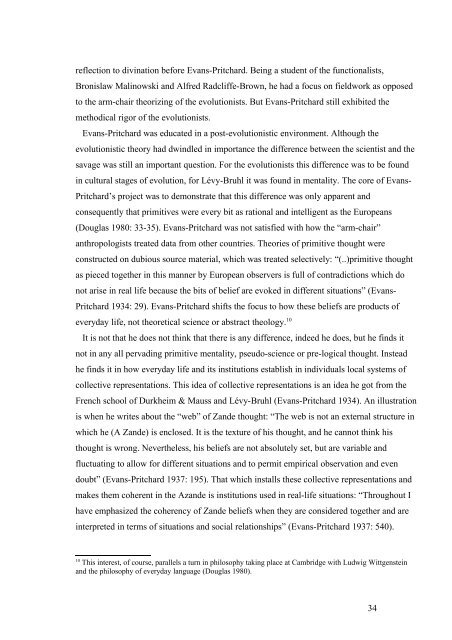The dissemination of divination in roman republican times
The dissemination of divination in roman republican times
The dissemination of divination in roman republican times
Create successful ePaper yourself
Turn your PDF publications into a flip-book with our unique Google optimized e-Paper software.
eflection to <strong>div<strong>in</strong>ation</strong> before Evans-Pritchard. Be<strong>in</strong>g a student <strong>of</strong> the functionalists,<br />
Bronislaw Mal<strong>in</strong>owski and Alfred Radcliffe-Brown, he had a focus on fieldwork as opposed<br />
to the arm-chair theoriz<strong>in</strong>g <strong>of</strong> the evolutionists. But Evans-Pritchard still exhibited the<br />
methodical rigor <strong>of</strong> the evolutionists.<br />
Evans-Pritchard was educated <strong>in</strong> a post-evolutionistic environment. Although the<br />
evolutionistic theory had dw<strong>in</strong>dled <strong>in</strong> importance the difference between the scientist and the<br />
savage was still an important question. For the evolutionists this difference was to be found<br />
<strong>in</strong> cultural stages <strong>of</strong> evolution, for Lévy-Bruhl it was found <strong>in</strong> mentality. <strong>The</strong> core <strong>of</strong> Evans-<br />
Pritchard’s project was to demonstrate that this difference was only apparent and<br />
consequently that primitives were every bit as rational and <strong>in</strong>telligent as the Europeans<br />
(Douglas 1980: 33-35). Evans-Pritchard was not satisfied with how the “arm-chair”<br />
anthropologists treated data from other countries. <strong>The</strong>ories <strong>of</strong> primitive thought were<br />
constructed on dubious source material, which was treated selectively: “(..)primitive thought<br />
as pieced together <strong>in</strong> this manner by European observers is full <strong>of</strong> contradictions which do<br />
not arise <strong>in</strong> real life because the bits <strong>of</strong> belief are evoked <strong>in</strong> different situations” (Evans-<br />
Pritchard 1934: 29). Evans-Pritchard shifts the focus to how these beliefs are products <strong>of</strong><br />
everyday life, not theoretical science or abstract theology. 10<br />
It is not that he does not th<strong>in</strong>k that there is any difference, <strong>in</strong>deed he does, but he f<strong>in</strong>ds it<br />
not <strong>in</strong> any all pervad<strong>in</strong>g primitive mentality, pseudo-science or pre-logical thought. Instead<br />
he f<strong>in</strong>ds it <strong>in</strong> how everyday life and its <strong>in</strong>stitutions establish <strong>in</strong> <strong>in</strong>dividuals local systems <strong>of</strong><br />
collective representations. This idea <strong>of</strong> collective representations is an idea he got from the<br />
French school <strong>of</strong> Durkheim & Mauss and Lévy-Bruhl (Evans-Pritchard 1934). An illustration<br />
is when he writes about the “web” <strong>of</strong> Zande thought: “<strong>The</strong> web is not an external structure <strong>in</strong><br />
which he (A Zande) is enclosed. It is the texture <strong>of</strong> his thought, and he cannot th<strong>in</strong>k his<br />
thought is wrong. Nevertheless, his beliefs are not absolutely set, but are variable and<br />
fluctuat<strong>in</strong>g to allow for different situations and to permit empirical observation and even<br />
doubt” (Evans-Pritchard 1937: 195). That which <strong>in</strong>stalls these collective representations and<br />
makes them coherent <strong>in</strong> the Azande is <strong>in</strong>stitutions used <strong>in</strong> real-life situations: “Throughout I<br />
have emphasized the coherency <strong>of</strong> Zande beliefs when they are considered together and are<br />
<strong>in</strong>terpreted <strong>in</strong> terms <strong>of</strong> situations and social relationships” (Evans-Pritchard 1937: 540).<br />
10 This <strong>in</strong>terest, <strong>of</strong> course, parallels a turn <strong>in</strong> philosophy tak<strong>in</strong>g place at Cambridge with Ludwig Wittgenste<strong>in</strong><br />
and the philosophy <strong>of</strong> everyday language (Douglas 1980).<br />
34


